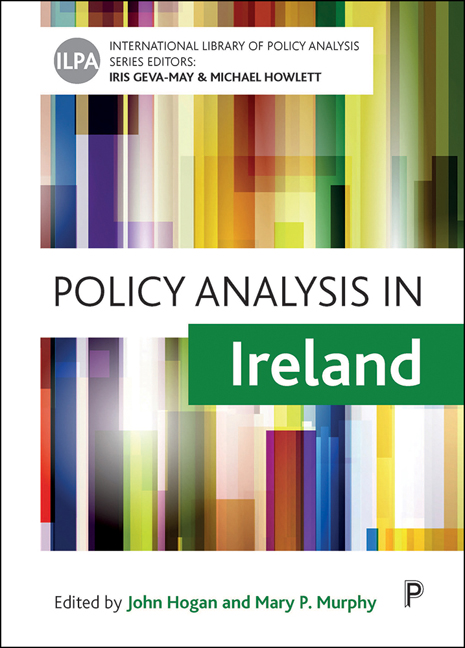Book contents
- Frontmatter
- Contents
- List of figures, tables and boxes
- List of abbreviations
- Notes on contributors
- Editors’ introduction to the series
- Acknowledgements
- Foreword
- Preface
- one Contextualising policy analysis in Ireland
- Part One: History, styles and methods of policy analysis in Ireland
- Part Two: Policy analysis at various levels of government: from local to the EU
- Part Three: Think tanks, interest groups, political parties and gender-based policy analysis
- Part Four: The public, science and the media: the wider policy analysis environment in Ireland
- Index
twelve - Civil society organisations and policy analysis
Published online by Cambridge University Press: 18 December 2021
- Frontmatter
- Contents
- List of figures, tables and boxes
- List of abbreviations
- Notes on contributors
- Editors’ introduction to the series
- Acknowledgements
- Foreword
- Preface
- one Contextualising policy analysis in Ireland
- Part One: History, styles and methods of policy analysis in Ireland
- Part Two: Policy analysis at various levels of government: from local to the EU
- Part Three: Think tanks, interest groups, political parties and gender-based policy analysis
- Part Four: The public, science and the media: the wider policy analysis environment in Ireland
- Index
Summary
Introduction
Over the past 30 years, civil society organisations (CSOs) have assumed an important role in Irish social, economic and environmental policy and have demonstrated resilience and versatility in their engagement with policy formation. Civil society has arguably led the social transformation of Ireland, as recent referenda have demonstrated, and the political elite has followed civil society's lead in debating and demanding the type of social change that leads Ireland into the 21st century. The historical and contemporary role of civil society will be particularly important now, at a moment of flux and reflection, as the fault-lines exposed by the COVID-19 pandemic, and already rehearsed in the historic 2020 general election, are laid bare. A broader public policy story about civil society would affirm and celebrate the political vitality and leadership of civil society; however, this book is not about public policy per se, but is more narrowly focused on ‘policy analysis’ and hence focuses more on CSOs’ engagement with public policy institutions and process – a narrower story. This story is not, however, onedimensional, but should be read in the context of the already proven ideational, campaigning and mobilising power of civil society [and social movements].
This chapter explores the types of capacity CSOs need for the different policy analysis functions, including research, advice, advocacy and communication. Two major themes emerge from the analysis. First, CSOs utilise a diverse range of models of change and their engagement with public policy does not evolve in a linear fashion but ebbs and flows. CSOs adapt their models of change to meet their immediate political environment, in some cases changing how they contribute to policy analysis. Technological changes, particularly Twitter and use of online surveys, also transform the context of how social media is used to utilise policy analysis and advocacy. The second theme relates to changes in the political opportunity structure (POS) CSOs find themselves in. Over the years of social partnership (SP) (see Chapter 10 and later in this chapter) (1987–2008), there was a rich institutional network of policy processes, committees and formal deliberations, albeit not necessarily inclusive. Since the 2008 global financial crisis, CSOs’ overall space for policy analysis has changed and is somewhat reduced. However, post-crisis, ‘new politics’ (NP) is characterised by new parliamentary and public forms of policy making that require new forms of policy-analytical capacity with different implications for CSOs.
- Type
- Chapter
- Information
- Policy Analysis in Ireland , pp. 171 - 186Publisher: Bristol University PressPrint publication year: 2021

